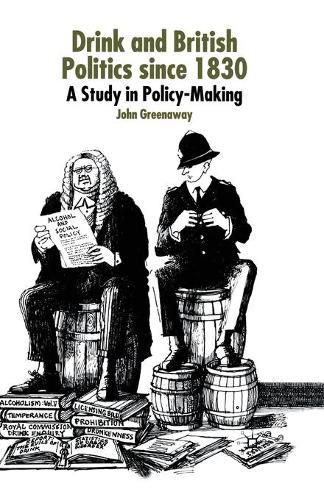Readings Newsletter
Become a Readings Member to make your shopping experience even easier.
Sign in or sign up for free!
You’re not far away from qualifying for FREE standard shipping within Australia
You’ve qualified for FREE standard shipping within Australia
The cart is loading…






This title is printed to order. This book may have been self-published. If so, we cannot guarantee the quality of the content. In the main most books will have gone through the editing process however some may not. We therefore suggest that you be aware of this before ordering this book. If in doubt check either the author or publisher’s details as we are unable to accept any returns unless they are faulty. Please contact us if you have any questions.
The issue of alcohol has never been far from British politics. Initially, governments needed to control its sale for public order reasons and because it was a major source of revenue. Then in Victorian times a powerful temperance movement arose which sought to prohibit or severely curb the ‘Demon Drink’. This in turn aroused the hostility of the ‘Trade’ and the issue became one of fierce electoral politics. After 1890 drink was interpreted more as a social reform question and then in the First World War, after a major moral panic, far-reaching measures of direct state control were imposed in the interests of national efficiency. Later in the Twentieth century alcohol use came to be seen as an aspect of leisure and town planning and, more recently, as a health issue. Drawing upon a wide range of primary sources, John Greenaway uses the complex politics of the issue to shed light upon the changing political system and to test various theories of the policymaking process. Both historians and political scientists will be interested in this study.
$9.00 standard shipping within Australia
FREE standard shipping within Australia for orders over $100.00
Express & International shipping calculated at checkout
This title is printed to order. This book may have been self-published. If so, we cannot guarantee the quality of the content. In the main most books will have gone through the editing process however some may not. We therefore suggest that you be aware of this before ordering this book. If in doubt check either the author or publisher’s details as we are unable to accept any returns unless they are faulty. Please contact us if you have any questions.
The issue of alcohol has never been far from British politics. Initially, governments needed to control its sale for public order reasons and because it was a major source of revenue. Then in Victorian times a powerful temperance movement arose which sought to prohibit or severely curb the ‘Demon Drink’. This in turn aroused the hostility of the ‘Trade’ and the issue became one of fierce electoral politics. After 1890 drink was interpreted more as a social reform question and then in the First World War, after a major moral panic, far-reaching measures of direct state control were imposed in the interests of national efficiency. Later in the Twentieth century alcohol use came to be seen as an aspect of leisure and town planning and, more recently, as a health issue. Drawing upon a wide range of primary sources, John Greenaway uses the complex politics of the issue to shed light upon the changing political system and to test various theories of the policymaking process. Both historians and political scientists will be interested in this study.